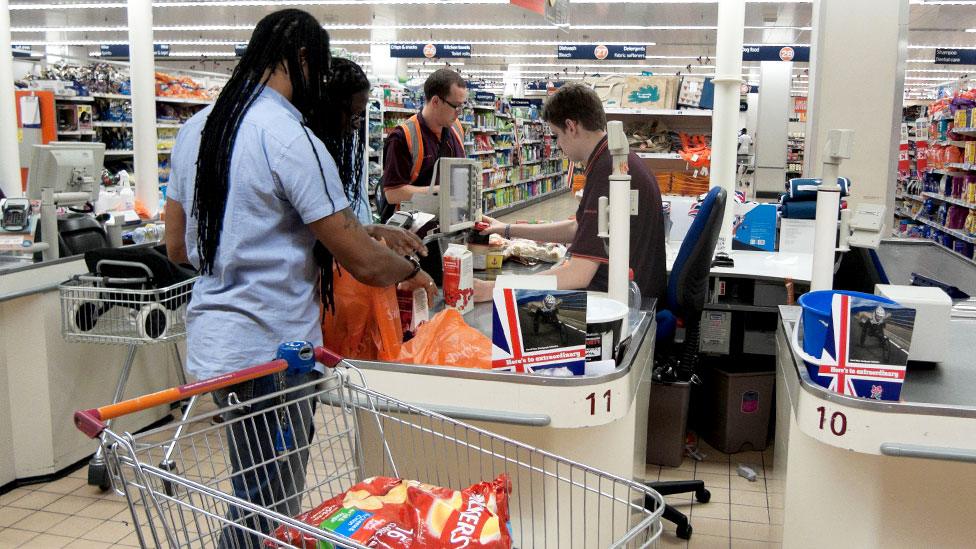Are these the foods millennials want to eat?
- Published
- comments
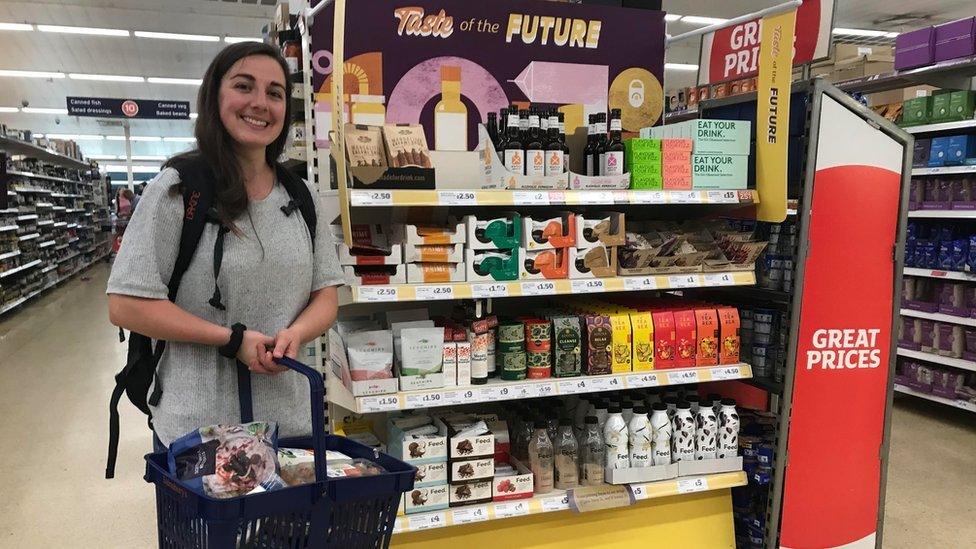
Andi Naude said a £4 coconut and chocolate bar was too expensive.
Andi Naude, a veterinary student, stops to look at a coconut and chocolate bar that calls itself a "complete meal" in a "convenient" pack.
Then she spots the £4 price tag.
The bar is part of a new trial range at Sainsbury's called "Taste of the Future", which the supermarket hopes will bring in more millennial shoppers.
It includes crisps made from salmon skin, alcoholic kombucha and a bottle of chocolate-flavoured powder that forms another "complete meal" when mixed with water.
But the stand is failing to excite customers in the supermarket chain's Camden store; Ms Naude describes the range as "sort of unique" but says the high price is putting her off.
In her basket are eggs and chicken but also veggie burgers and tofu. At 23 she is one of a growing number of young people trying to cut back on the amount of meat she eats.
While the number of people who class themselves as vegetarian had stayed steady at roughly one in 20 over the last five years, Katie Shade, an analyst at Kantar, says there's been an increase in the number of people who consider themselves flexitarians.
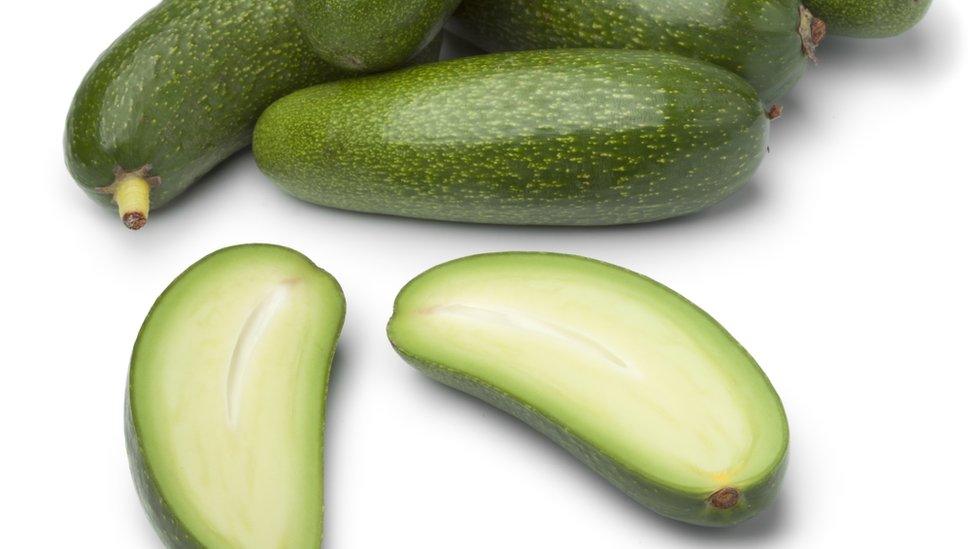
Marks & Spencer launched a stoneless avocado in 2017
Sainsbury's isn't the first established brand to try and attract younger customers with new and unusual food launches.
In 2017, just as avocado on toast became the meal of choice for many young people, Marks and Spencer launched a stoneless avocado with an edible skin.
Its key selling point - the supermarket said - was to help banish so called "avocado hand", the injuries people sustained when trying to remove the stones.
And last year, Tesco, started selling smaller wine bottles targeted at millennials that want to cut back on their drinking.
Meanwhile, supermarket chain Morrisons recently started a new food delivery service, dubbed Eat Fresh, offering boxes of ingredients and recipes to allow time-pressed customers to cook homemade meals in under half an hour.
The main supermarkets are also increasingly offering unusual vegetarian options with names clearly aimed at attracting younger consumers. The Co-op recently unveiled an Irresistible Smoked Almond Super Green salad, while Tesco's Wicked Kitchen range, includes items such as a Hipster Salad and a Smoked Carrot Celebration Sandwich.
Supermarkets are also dedicating shelf space to smaller brands, offering more exciting or healthier alternatives.
Graze - a start-up offering healthy snack boxes - originally sold directly to consumers by post. Now Asda, Waitrose, Sainsbury's and Ocado all stock the products on their shelves.
'Modern medicine'
Sainsbury's aim with its new food launch is to create a "modern medicine cabinet", according to Alex Beckett, a food and drink analyst at Mintel.
He says under-40s want "quick-fix health products that promise added vitamins, gut health, protein, relaxation" in an "affordable pocket-sized offering".
"It's the mindset that everything has to do something else, has to be multi-functional, in this smartphone generation - and that goes for food and drink as well," Mr Beckett says.
That's not the only way smartphones have influenced the millennial palate. The retail analyst says younger shoppers are looking for "distinctive trophies" - unusual new foods to share pictures of on social media.
Thomas Brereton, a retail analyst at Global Data, is more cynical, describing the new Sainsbury's range as a "marketing ploy".
He sees these new food fashions as something similar to High Street fashion trends, something to take photos of before you go back to your usual diet.
"It's why people like to drink gin out of jam jars. It's basically a novel experience for these people, that they haven't tried the latest seaweed crisp or whatever it is."
But he says it's important to distinguish between fad products and those that seek to serve growing markets, like meat-free foods.
Of the quirkier products finding their way onto supermarket shelves, Mr Brereton says he doesn't expect many of them to be around in six months time.
Some of them may not last that long.
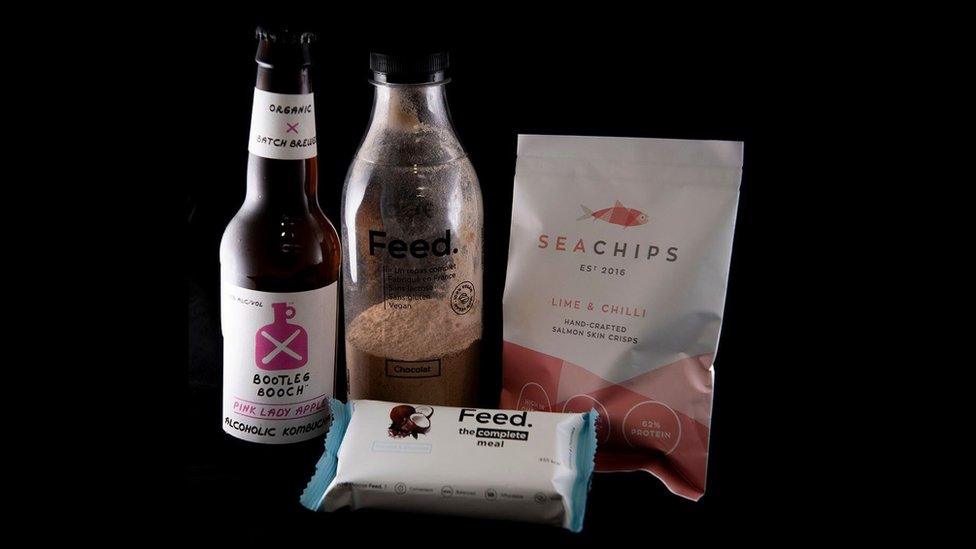
Alcoholic kombucha, a coconut and chocolate meal bar, salmon skin crisps and a powdered chocolate meal drink.
In the Camden Sainsbury's 45-year-old Kay, says her eye has certainly been caught by the colourful packaging on a pack of smoked seaweed essence.
But she says that at £9 it and the other products seem over-priced.
Store manager Richard Green says the range is targeted at "people who like trying new things" and those that "don't mind paying a premium for premium products".
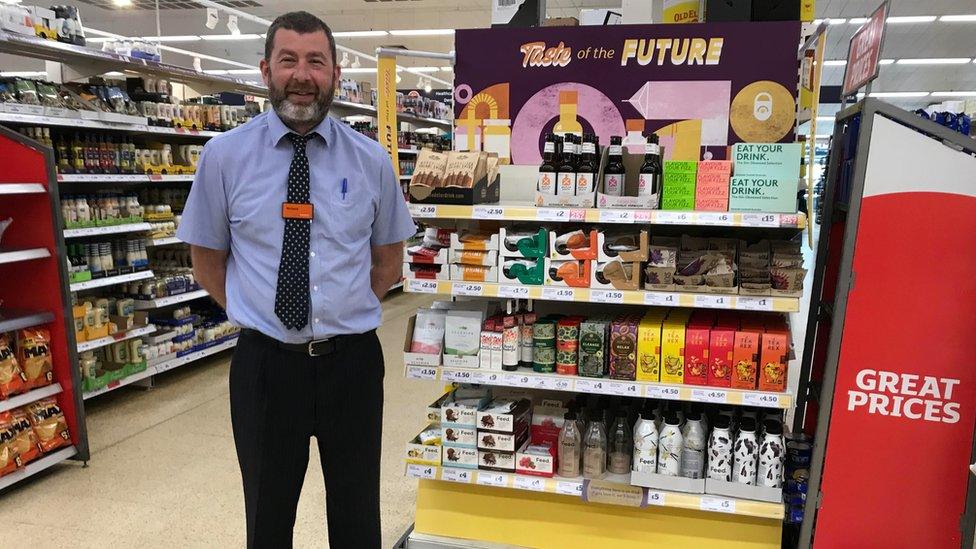
Camden's store manager, Richard Green, stands next to the new range.
"The only way you make money on your core range is volume, if you make money at all," he says. The branching out away from the bread-and-butter products is something Sainsbury's has always done, he says.
"Most of our margins on food are tiny, the margins on that [the new range] will be fierce," he says.
But Sainsbury's head of brands, Rachel Eyre, says the pricing is "just how we normally price."
Ms Eyre says the chain charges "what we think that a customer will find fair for a product that they're considering". The 14-week trial of the new range will show whether the chain had got the pricing right, she adds.
Sainsbury's is hoping that the range will appeal to all ages, she adds, testing the ground for more new emerging products.
"Every bit of space on every shelf in every supermarket is incredibly important to us. It's a highly competitive market so we wouldn't have put anything on there if we didn't have some belief that it could do well."
- Published13 August 2018
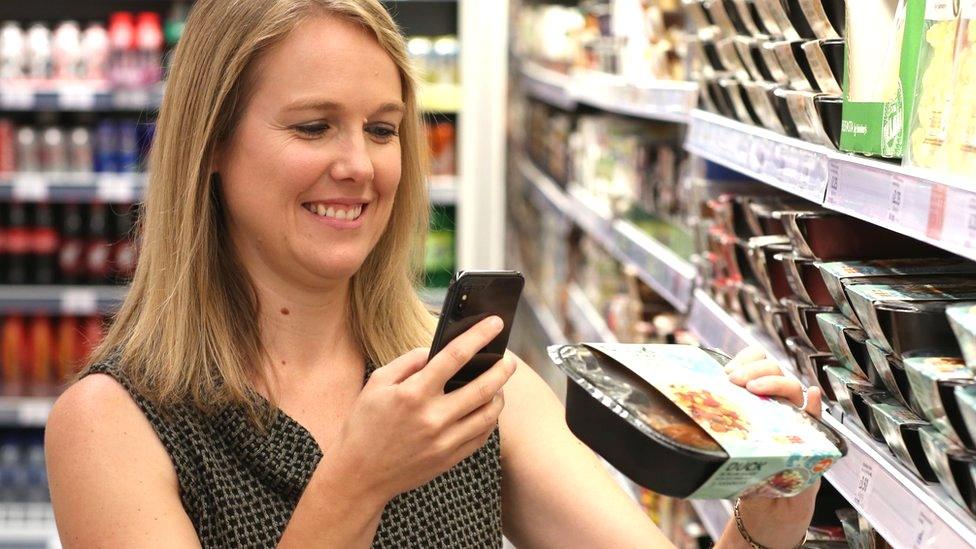
- Published25 April 2019
